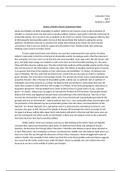Essay
brainstorming for essay PHIL 384 - Suffering and Belief in God
- Course
- Philosophy (PHIL384)
- Institution
- Trinity Western University (TWU )
PHIL 384 - Suffering and Belief in God outline and brainstorming for the final argumentative essay. An examination of key issues pertaining to suffering and belief in God. Topics include the problem of evil, arguments from suffering, original sin, everlasting suffering, and providence.
[Show more]



